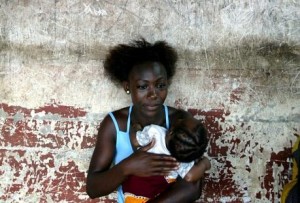MONROVIA (Reuters Trustlaw) – When darkness falls on Monrovia and most of the Liberian capital’s half a million inhabitants return home to rest, an army of teenage girls as young as 13 sets out to work as underage prostitutes, charging as little as 5 Liberian dollars (3 U.S cents) to clients who often abuse them.

“I went on the street the year before last when I was 13 years of age because I had no one doing it (taking care) for me, I was living with friends, and all of them [were] doing the same thing. So I decided to do it to sustain myself,” said Tracy Modewa, 15 (not her real name). All of the names of the girls in this story have been changed to protect their identities.
Modewa is one of a dozen teenage girls, scrawny and bruised, huddled around the glow of a candle in a cramped 10 -foot by 15-foot concrete room meant to store a generator in downtown Monrovia. They take turns sleeping on a single dingy mattress during the day before heading to the streets to work at night.
Prostitution by young teenage girls is in part fallout from 14 years of civil war, which had spawned numbers of orphans and street children by its official end in 2003. Although Liberia currently has a democratically-elected government, a free press and an improving economy, the practice of teen prostitution lingers. Girls sell sex for money, food and school fees, the U.S. State Department’s report on human rights in Liberia said last year.
Observers say while aid groups focus their work on young male ex-combatants, who committed atrocities across the country and used rape as a weapon, little attention is paid to the female victims of the war, such as child sex workers sleeping with several men a night to be able to eat and clothe themselves.
Gaunt and hollow-eyed, Mimi Tebro (not her real name), 16, who also shares the generator room, said she has been supporting herself since 2003, the last year of war in Liberia, when both her parents were killed.
“If the street is hard maybe 10, 12, 15 men per night I sleep with, but if the street is moving, I would sleep with almost 20,” she said. Prostitution is illegal in Liberia.
Tebro gave birth two years ago in the same generator room, with another sex worker acting as a midwife, because she couldn’t afford to go to the hospital. Her little boy recently died, she said.
“I cared for him very much,” she said.
Four in five Liberians live below the U.N. poverty line of US$2 per day, driving many girls to become breadwinners for their families through prostitution.
“There are some parents who even encourage it,” says Zeor Daylue Bernard, acting chairperson of the Association of Female Lawyers of Liberia (AFLL).
These girls also face violent abuse from their clients, ranging from beatings to rape in a country where 66 percent of girls between the ages of 10 and 19 have been raped, according to the U.N.
One of the girls showed a deep wound in her foot she suffered when a client refused to pay and pushed her out of his car. Another said she received a crack on the head after a client struck her with a rock.
There is no formal police programme to stop child prostitution but Liberian president Ellen Johnson Sirleaf recently charged police with monitoring areas where teenage prostitutes are known to work.
However, some of the girls say that the police are also abusive – sleeping with them and seizing and extorting money from them.
“For someone to make claims that police officers are involved in such an act, that is very serious. What we are going to do is monitor the officers’ behavior,” police spokesman George Bardue told Trustlaw.
With most of the state structure having collapsed during the war, most of Liberia’s security is in the hands of an 8000-member U.N. peacekeeping force (UNMIL). Girls have alleged that some peacekeepers also pay for sex with underage girls.
“Although it’s a lot less common than it was in the past, I’d say it does happen. There will always be some bad apples,” said George Somerwill, a spokesman for UNMIL. He said an investigation on the allegations would be launched soon.
Human rights groups operating in Liberia say many of the children involved would like to get out of prostitution if there was a government programme to help them find an alternative way to support themselves.
A government spokesman said authorities were planning to create a home for these child sex workers in a town near Monrovia.
“I’d really tell the president she should help us to move off the street because I really want to go to school. I really want that woman help us to leave the street life” said Tebro.
“Sometimes I sit down and think, men will have me for 40 or 50 (Liberian) dollars. Maybe six men before I have 300. I have to suffer. I’m really tired of the street life.”
(Additional reporting by Tecee Boley and Clara K. Mallah)
